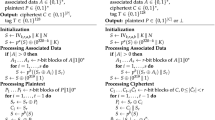Abstract
Quantum homomorphic encryption (QHE) allows computation on encrypted data by employing the principles of quantum mechanics. Usually, only one evaluator is chosen to complete such computation and it is easy to get overburdened in network. In addition, users sometimes do not trust only one evalutor. Recently, Chen et al. proposed a very flexible QHE scheme based on the idea of (k, n)-threshold quantum state sharing where d evaluators can finish the required operations by cooperating together as long as \( k \le d \le n\). But it can only calculate some of single-qubit unitary operations when \(k\ge 2\) and the quantum capability of each evaluator is a bit demanding. In this paper, we propose an improved flexible QHE scheme which extends the operations that can be computed in the QHE scheme proposed by Chen et al. to involve all single-qubit unitary operations even if \(k \ge 2\) and reduces the quantum capability of at least \(d-1\) evaluators. We also give an example to show the feasibility of the improved scheme and simulate it on the IBM’s cloud quantum computing platform.





Similar content being viewed by others
References
Alagic G., Dulek Y., Schaffner C., Speelman F.: Quantum fully homomorphic encryption with verification. Adv. Cryptol. 2017, 438–467 (2017).
Broadbent A., Jeffery S.: Quantum homomorphic encryption for circuits of low T-gate complexity. Adv. Cryptol. 2015, 609–629 (2015).
Broadbent A., Schaffner C.: Quantum cryptography beyond quantum key distribution. Des. Codes Cryptogr. 78, 351–382 (2016).
Chen X.B., Sun Y.R., Xu G., Yang Y.X.: Quantum homomorphic encryption scheme with flexible number of evaluator based on (\(k\), \(n\))-threshold quantum state sharing. Inf. Sci. 501, 172–181 (2019).
Chen L., Li Q., Liu C., Peng Y., Yu F.: Efficient mediated semi-quantum key distribution. Physica A 582, 126265 (2021).
Dulek Y., Schaffner C., Speelman F.: Quantum homomorphic encryption for polynomial-sized circuits. Adv. Cryptol. 2016, 3–32 (2016).
Fisher K.A.G., Broadbent A., Shalm L.K., Yan Z., Lavoie J., Prevedel R., Jennewein T., Resch K.J.: Quantum computing on encrypted data. Nat. Commun. 5, 3074 (2014).
Fitzsimons J.F., Kashefi E.: Unconditionally verifiable blind quantum computation. Phys. Rev. A 96, 12303 (2017).
Kimble H.J.: The quantum internet. Nature 453, 1023–1030 (2008).
Kong X.Q., Li Q., Wu C.H., Yu F., He J.J., Sun Z.Y.: Multiple-server flexible blind quantum computation in networks. Int. J .Theor. Phys. 55, 3001–3007 (2016).
Lai C.Y., Chung K.M.: On statistically-secure quantum homomorphic encryption. Quantum Inf. Comput. 18, 785–794 (2017).
Lai C.Y., Chung K.M.: Quantum encryption and generalized Shannon impossibility. Des. Codes Cryptogr. 87, 1961–1972 (2019).
Li Q., Chan W.H., Wu C.H., Wen Z.H.: Triple-server blind quantum computation using entanglement swapping. Phys. Rev. A 89, 040302 (2014).
Liang M.: Symmetric quantum fully homomorphic encryption with perfect security. Quantum Inf. Process. 12, 3675–3687 (2013).
Liang M.: Quantum fully homomorphic encryption scheme based on universal quantum circuit. Quantum Inf. Process. 14, 2749–2759 (2015).
Mahadev U.: Classical homomorphic encryption for quantum circuits. In IEEE 59th Annual Symposium on Foundations of Computer Science (FOCS), pp. 332–338 (2018).
Marshall K., Jacobsen C.S., Schäfermeier C., Gehring T., Weedbrook C., Andersen U.L.: Continuous-variable quantum computing on encrypted data. Nat. Commun. 7, 13795 (2016).
Moreno M.G.M., Brito S., Nery R.V., Chaves R.: Device-independent secret sharing and a stronger form of Bell nonlocality. Phys. Rev. A 101, 52339 (2020).
Nielsen M., Chuang I.: Quantum Computation and Quantum Information. Cambridge University Press, Cambridge (2011).
Oliveira M., Nape I., Pinnell J., TabeBordbar N., Forbes A.: Experimental high-dimensional quantum secret sharing with spin-orbit-structured photons. Phys. Rev. A 101, 42303 (2020).
Ouyang Y., Tan S.H., Zhao L., Fitzsimons J.F.: Computing on quantum shared secrets. Phys. Rev. A 96, 052333 (2017).
Ouyang Y., Tan S.H., Fitzsimons J.F.: Quantum homomorphic encryption from quantum codes. Phys. Rev. A 98, 42334 (2018).
Pati A.K., Agrawal P.: Special issue on quantum information theory. Quantum Inf. Process. 11, 637–638 (2012).
Senthoor K., Sarvepalli P.K.: Communication efficient quantum secret sharing. Phys. Rev. A 100, 52313 (2019).
Tan S.H., Kettlewell J.A., Ouyang Y., Chen L., Fitzsimons J.F.: A quantum approach to homomorphic encryption. Sci. Rep. 6, 33467 (2016).
Wang Y., She K., Luo Q., Yang F., Zhao C.: Symmetric ternary quantum homomorphic encryption schemes based on the ternary quantum one-time pad. ArXiv preprint arXiv:1505.02854 (2015).
Wojciech, K., Stephanie, W.: Towards large-scale quantum networks. In Proceedings of the Sixth Annual ACM International Conference on Nanoscale Computing and Communication, pp. 1–7 (2019).
Xu G., Xiao K., Li Z.P., Niu X.X., Ryan M.: Controlled secure direct communication protocol via the three-qubit partially entangled set of states. CMC-Comput. Mater. Contin. 58, 809–827 (2019).
Yu L., Pérez-Delgado C.A., Fitzsimons J.F.: Limitations on information-theoretically-secure quantum homomorphic encryption. Phys. Rev. A 90, 050303 (2014).
Zhang J.W., Chen X.B., Xu G., Yang Y.X.: Universal quantum circuit evaluation on encrypted data using probabilistic quantum homomorphic encryption scheme. Chin. Phys. B 30, 70309–070309 (2021).
Acknowledgements
This work was supported the Key Project of Hunan Province Education Department (Grant No. 20A471), the Natural Science Foundation of Hunan Province (Grant Nos. 2018JJ2403, 2020JJ4750), the National Natural Science Foundation of China (Grant Nos. U1736113, 61972418), and H. Situ is supported by Guangdong Basic and Applied Basic Research Foundation (Grant No. 2020A1515011204).
Author information
Authors and Affiliations
Corresponding author
Additional information
Communicated by A. Winterhof.
Publisher's Note
Springer Nature remains neutral with regard to jurisdictional claims in published maps and institutional affiliations.
Rights and permissions
About this article
Cite this article
Liu, J., Li, Q., Quan, J. et al. Efficient quantum homomorphic encryption scheme with flexible evaluators and its simulation. Des. Codes Cryptogr. 90, 577–591 (2022). https://doi.org/10.1007/s10623-021-00993-2
Received:
Revised:
Accepted:
Published:
Issue Date:
DOI: https://doi.org/10.1007/s10623-021-00993-2




